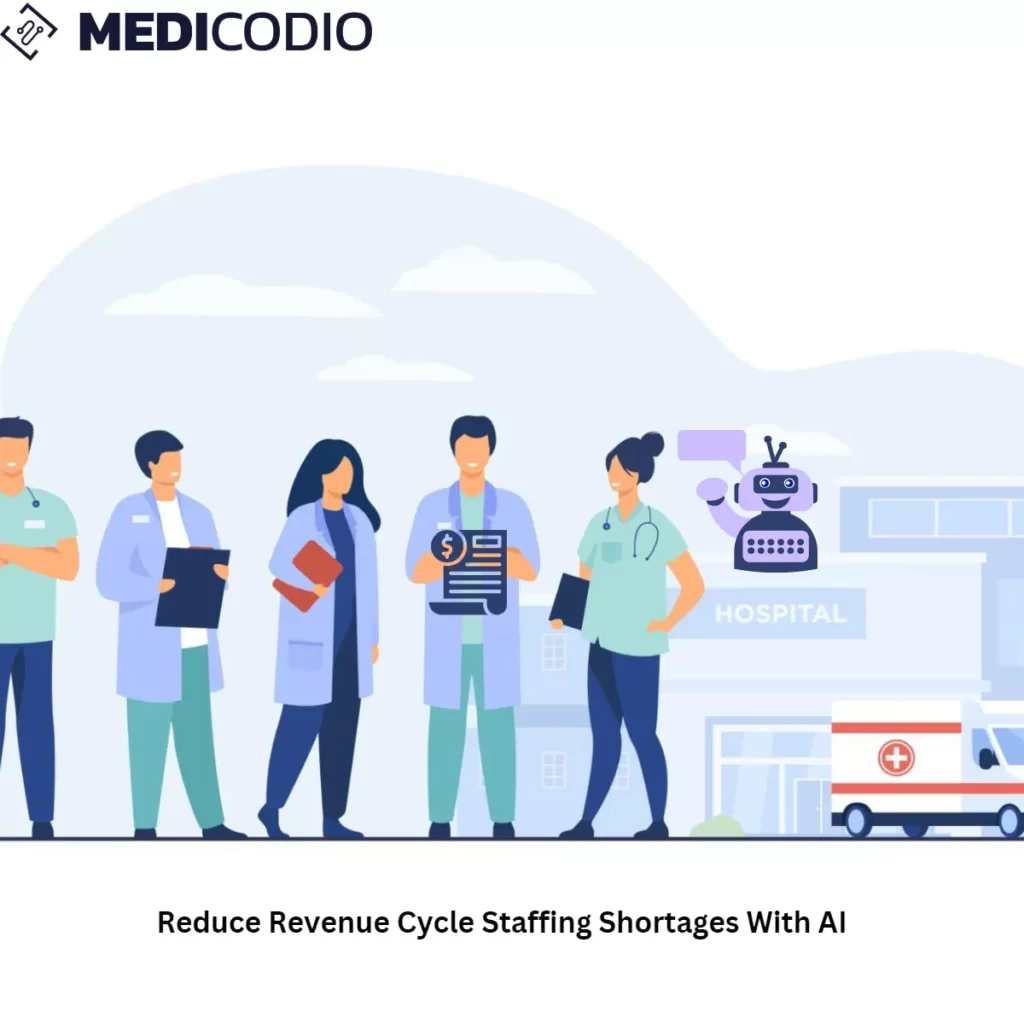63% of healthcare providers indicated that they are facing revenue cycle staffing shortages, according to a CWH Advisors report from the 2022 PatientPay study. On the one hand, the number of new patient cases is increasing drastically; on the other hand, there aren’t enough coders to manage the patient cases. According to AHA, total patient admissions in all U.S. Hospitals have reached 34,011,386 per year. As a result of increasing patient cases and revenue cycle staffing shortages, revenue cycle departments throughout the country are dealing with coder burnout, increasing coding and billing errors, claim denials, delayed payment cycles, and other issues that jeopardize the financial sustainability of healthcare organizations.
It would be highly advantageous to adopt an advanced automated medical coding tool to tackle the problem of insufficient staff in the revenue cycle and ensure long-term financial stability. This solution employs artificial intelligence to fully automate the process of medical coding.
What is automated medical coding (healthcare coding)?
Automated medical coding is a process that uses artificial intelligence to assign standardized codes to medical diagnoses, procedures, and services. These codes are used for billing, reimbursement, and quality improvement purposes in the healthcare industry.
Reasons For Revenue Cycle Staffing Shortages
Revenue cycle staffing shortages are a common challenge for many healthcare organizations. Here are five possible reasons for this problem:
– High turnover rates: Revenue cycle staff often face high levels of stress, burnout, and dissatisfaction due to their work’s complex and demanding nature. This can lead to frequent resignations and low retention rates.
– Lack of training and development: Revenue cycle staff need to have adequate skills and knowledge to handle the constantly changing regulations, policies, and technologies in the healthcare industry. However, many organizations do not invest enough in training and development programs for their staff, resulting in skill gaps and performance issues.
– Inadequate compensation and benefits: Revenue cycle staff may feel underpaid and undervalued compared to other healthcare professionals. They may also lack sufficient incentives and rewards for their work, such as bonuses, recognition, or career advancement opportunities.
– Poor workflow and processes: Revenue cycle staff may encounter inefficient and ineffective workflow and processes in their daily tasks, such as manual data entry, redundant steps, or lack of communication and collaboration. These can cause errors, delays, and frustration for the staff and the patients.
– Competition from other sectors: Revenue cycle staff may be attracted to other sectors that offer better pay, benefits, or a work environment, such as finance, insurance, or technology. These sectors may also have a higher demand for revenue cycle skills and experience, making it easier for the staff to find alternative employment options.

Revenue cycle staffing shortage: AI-powered Automation to the Rescue
Automation in the revenue cycle can be approached in different ways, each with its own benefits and use cases. One approach is the automation of repetitive tasks using technologies like robotic process automation (RPA). RPA software can automate tasks such as data entry and cost estimate generation, freeing up RCM staff to focus on more complex processes. On the other end of the spectrum is the automation of revenue cycle stages, such as automated medical coding. Automated coding solutions leverage AI technologies like machine learning and natural language processing to automate the medical coding stage of RCM. This addresses staffing shortages and provides long-term stability to RCM departments.
Healthcare organizations can overcome the revenue cycle staffing shortage by leveraging AI in several ways. By using automated medical coding solutions, organizations can reduce staff burnout by reducing the workload for coding staff. It allows coders to focus on complex cases and improves coding quality. These solutions also help resolve coding backlogs and accelerate payment cycles, which can be affected by the increased volume of charts. Automated medical coding solutions are capable of processing hundreds, if not thousands, of charts per hour, mitigating the risk of delays in payment cycles.
As per the 2020 Medicare CERT Report, 10% of (delayed, denied, or inaccurate) payments were due to coding errors and 69% are due to missing documentation. Automation can reduce medical coding errors by using artificial intelligence (AI) and natural language processing (NLP) to analyze clinical documents and assign accurate codes based on predefined rules and guidelines. Automation can also improve the efficiency and productivity of medical coders by reducing manual work and providing feedback and suggestions for improvement. Automation can enhance the quality and consistency of medical coding, which can benefit the healthcare system as a whole.
MEDICODIO has developed a robust AI-powered medical coding solution called CODIO. Powered by their innovative medical language understanding technology, MEDICODIO’s engine deciphers medical language in patient charts and assigns compliant medical charge codes. It processes thousands of charts per hour with over 85% coding accuracy.
Don’t let the revenue cycle staffing shortage stress get to you, hire CODIO, an AI-powered medical coding Assistant.
The existing revenue cycle management staffing issue is not likely going to change soon, and you cannot ignore the issue. Smart organizations have discovered how to remain efficient in their RCM even with the labor shortage, and that’s what automation allows you to do.
MEDICODIO’s robust AI medical coding tool allows you to automate your medical coding process in the revenue cycle process, so you can boost your medical coders’ efficiency and productivity, and meet your revenue goals. Book a demo to see how MEDICODIO can help you revolutionize the medical coding and RCM space.





